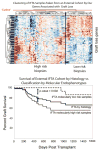Gene Expression in Biopsies of Acute Rejection and Interstitial Fibrosis/Tubular Atrophy Reveals Highly Shared Mechanisms That Correlate With Worse Long-Term Outcomes
- PMID: 26990570
- PMCID: PMC5501990
- DOI: 10.1111/ajt.13728
Gene Expression in Biopsies of Acute Rejection and Interstitial Fibrosis/Tubular Atrophy Reveals Highly Shared Mechanisms That Correlate With Worse Long-Term Outcomes
Abstract
Interstitial fibrosis and tubular atrophy (IFTA) is found in approximately 25% of 1-year biopsies posttransplant. It is known that IFTA correlates with decreased graft survival when histological evidence of inflammation is present. Identifying the mechanistic etiology of IFTA is important to understanding why long-term graft survival has not changed as expected despite improved immunosuppression and dramatically reduced rates of clinical acute rejection (AR) (Services UDoHaH. http://www.ustransplant.org/annual_reports/current/509a_ki.htm). Gene expression profiles of 234 graft biopsy samples were obtained with matching clinical and outcome data. Eighty-one IFTA biopsies were divided into subphenotypes by degree of histological inflammation: IFTA with AR, IFTA with inflammation, and IFTA without inflammation. Samples with AR (n = 54) and normally functioning transplants (TX; n = 99) were used in comparisons. A novel analysis using gene coexpression networks revealed that all IFTA phenotypes were strongly enriched for dysregulated gene pathways and these were shared with the biopsy profiles of AR, including IFTA samples without histological evidence of inflammation. Thus, by molecular profiling we demonstrate that most IFTA samples have ongoing immune-mediated injury or chronic rejection that is more sensitively detected by gene expression profiling. These molecular biopsy profiles correlated with future graft loss in IFTA samples without inflammation.
Keywords: Interstitial fibrosis and tubular atrophy; basic (laboratory) research/science; genomics; graft survival; immunobiology; kidney (allograft) function/dysfunction; kidney transplantation/nephrology; organ transplantation in general; rejection: T cell mediated (TCMR); translational research/science.
© Copyright 2016 The American Society of Transplantation and the American Society of Transplant Surgeons.
Conflict of interest statement
The authors of this manuscript have conflicts of interest to disclose as described by the
Figures










Comment in
-
Hidden Inflammatory Molecular Signatures in Graft Kidney Biopsies: Silent Markers of Graft Fate?Am J Transplant. 2016 Jul;16(7):1947-8. doi: 10.1111/ajt.13754. Epub 2016 Mar 15. Am J Transplant. 2016. PMID: 26880183 No abstract available.
Similar articles
-
Changes in Urinary Microbiome Populations Correlate in Kidney Transplants With Interstitial Fibrosis and Tubular Atrophy Documented in Early Surveillance Biopsies.Am J Transplant. 2017 Mar;17(3):712-723. doi: 10.1111/ajt.14038. Epub 2016 Oct 11. Am J Transplant. 2017. PMID: 27597148 Free PMC article.
-
Profiling of mRNA of interstitial fibrosis and tubular atrophy with subclinical inflammation in recipients after kidney transplantation.Aging (Albany NY). 2019 Jul 25;11(14):5215-5231. doi: 10.18632/aging.102115. Aging (Albany NY). 2019. PMID: 31343413 Free PMC article.
-
Effects of DNA Methylation on Progression to Interstitial Fibrosis and Tubular Atrophy in Renal Allograft Biopsies: A Multi-Omics Approach.Am J Transplant. 2017 Dec;17(12):3060-3075. doi: 10.1111/ajt.14372. Epub 2017 Jul 8. Am J Transplant. 2017. PMID: 28556588 Free PMC article.
-
Advances in biomarkers of acute allograft rejection and interstitial fibrosis/tubular atrophy in kidney transplantation; future perspective and challenges in clinical implementation.Transplant Rev (Orlando). 2025 Jul;39(3):100930. doi: 10.1016/j.trre.2025.100930. Epub 2025 Apr 8. Transplant Rev (Orlando). 2025. PMID: 40215632 Review.
-
Chronic allograft nephropathy or interstitial fibrosis and tubular atrophy: what is in a name?Curr Opin Nephrol Hypertens. 2014 May;23(3):245-50. doi: 10.1097/01.mnh.0000444811.26884.2d. Curr Opin Nephrol Hypertens. 2014. PMID: 24626060 Review.
Cited by
-
Transplantation: Utilizing the transcriptome to predict allograft fibrosis.Nat Rev Nephrol. 2016 Nov;12(11):652-653. doi: 10.1038/nrneph.2016.134. Epub 2016 Sep 19. Nat Rev Nephrol. 2016. PMID: 27641134 No abstract available.
-
Orthogonal Comparison of Molecular Signatures of Kidney Transplants With Subclinical and Clinical Acute Rejection: Equivalent Performance Is Agnostic to Both Technology and Platform.Am J Transplant. 2017 Aug;17(8):2103-2116. doi: 10.1111/ajt.14224. Epub 2017 Apr 3. Am J Transplant. 2017. PMID: 28188669 Free PMC article.
-
Donor-Recipient Non-HLA Variants, Mismatches and Renal Allograft Outcomes: Evolving Paradigms.Front Immunol. 2022 Apr 1;13:822353. doi: 10.3389/fimmu.2022.822353. eCollection 2022. Front Immunol. 2022. PMID: 35432337 Free PMC article. Review.
-
Revealing Potential Diagnostic Gene Biomarkers Associated with Immune Infiltration in Patients with Renal Fibrosis Based on Machine Learning Analysis.J Immunol Res. 2022 Apr 20;2022:3027200. doi: 10.1155/2022/3027200. eCollection 2022. J Immunol Res. 2022. PMID: 35497880 Free PMC article.
-
Knowing the allograft's destiny.Transl Androl Urol. 2017 Apr;6(2):313-314. doi: 10.21037/tau.2017.03.27. Transl Androl Urol. 2017. PMID: 28540243 Free PMC article. No abstract available.
References
-
- Cosio FG, Grande JP, Wadei H, Larson TS, Griffin MD, Stegall MD. Predicting subsequent decline in kidney allograft function from early surveillance biopsies. Am J Transplant. 2005;5:2464–2472. - PubMed
-
- Heilman RL, Smith ML, Kurian SM, et al. Transplanting kidneys from deceased donors with severe acute kidney injury. Am J Transplant. 2015;15:2143–2151. - PubMed
Publication types
MeSH terms
Grants and funding
LinkOut - more resources
Full Text Sources
Other Literature Sources
Medical
Molecular Biology Databases
Research Materials

